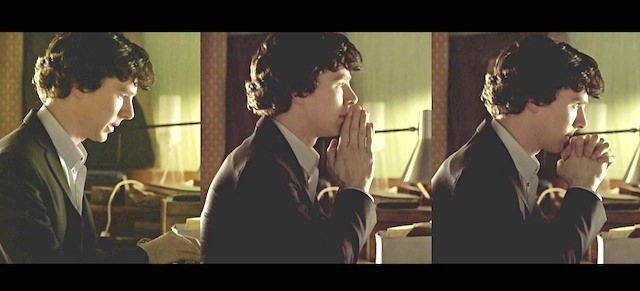
Perhaps I’ve just been ignorant of British television, but it seems that the BBC is enjoying the same golden age as so many US channels right now. Downton Abbey has already received a great deal of much-deserved praise from pretty much everyone, but I want to draw attention to BBC’s Sherlock. If you haven’t seen it, this remake of a classic character is better than any crime drama on TV today. The show takes the old Sherlock stories (“A Study in Scarlett”, for example) and updates the plot for modern times. But just like the original, the most interesting aspect of Sherlock is Sherlock Holmes himself. It is fascinating to see how the “master of observation” struggles to fit within society and human relationships. Like the original, Sherlock is a genius who solves crimes. But the original often skates over the social implication of Sherlock’s genius: his gift for solving puzzles also isolates him from almost everyone.
[youtube=http://www.youtube.com/watch?v=XSlRigSb3fs&w=600]
In the video above, Sherlock can masterfully perceive everything except the one fact that was standing right in front of him. Molly has dressed up for him, waiting in anticipation of giving Sherlock a gift she hopes will win him over. Everyone else in the room knew exactly what was going on the minute Molly walked in, yet Sherlock was painfully blind to understand the obvious.
The original Sherlock Holmes espoused the virtues of rationality and its ability to answer life’s unanswerable questions. For all his many eccentricities, Sherlock represents the triumph of pure deductive reason over against superstition. As Watson remarks in “A Scandal in Bohemia”: “You would certainly have been burned, had you lived a few centuries ago.” There was always a perfectly rational explanation to the unexplained mysteries presented to him, one just needed to have the ability to perceive the truth. The old Sherlock is able to perceive not because he has better eyes, but because he is dispassionate, not bound to a particular point of view and without bias or prejudice.
By contrast, the new Sherlock is a commentary on the limitations of rationality. The new Sherlock is exactly the same as the old one; using his powers of deduction, he solves crimes with unparalleled skill. However the new series also delves more deeply into Holmes’ personal life. Why does Holmes have just one friend? Why does he work alone? While he brilliantly assembles minute details into truthful conclusions regarding people’s activities and interests, he is completely blind to see how these truths interact with both himself and other people. Holmes cannot see people as people, but facts which might broadly resemble a person. Holmes cannot understand because he does not care to understand. To become so subjectively involved would be to undermine his commitment to pure deduction.
In many ways, the new Sherlock Holmes demonstrates that some truth cannot be seen by rational, disinterested [read: scientific/historical] observation. While Sherlock sees, he does not perceive. Though he hears, he does not understand (Mark 4:12). Some truth can only be understood by a sympathetic interpreter who is personally captivated the subject matter. More specifically, you cannot approach matters of faith and love from a distance, unaffected by Who you encounter. To live life like Sherlock Holmes is to always remain above the fray at a distance from everyone else. Instead, in faith and love you must irrationally risk yourself to the other person, approaching them not in self-righteous hostility, but in free surrender.

COMMENTS
3 responses to “The Modern Misadventures of Sherlock Holmes and the Limits of Rationality”
Leave a Reply















Thank you for highlighting this show. It has been one of my favorites and it deserves to be talked about more!